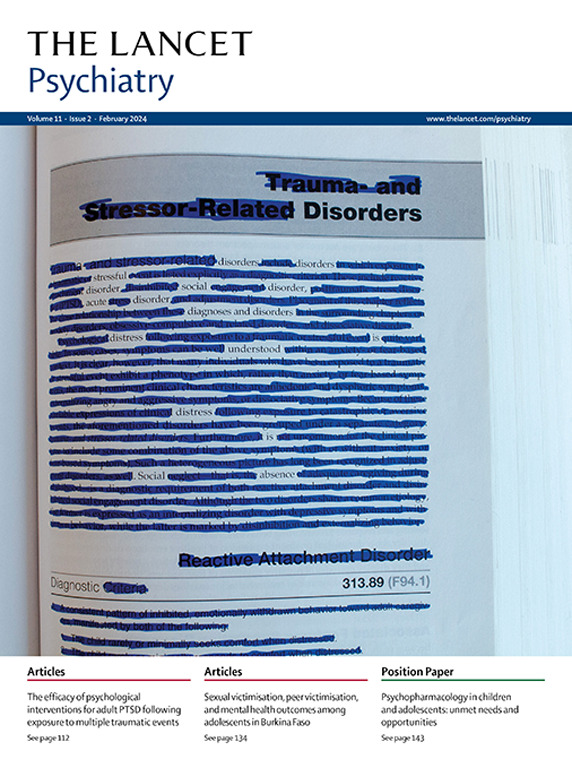Psychological interventions to prevent the onset of major depression in adults: a systematic review and individual participant data meta-analysis
IF 30.8
1区 医学
Q1 PSYCHIATRY
引用次数: 0
Abstract
Background
Psychological interventions are increasingly discussed as a method to prevent major depressive disorder (MDD) in adults who already experience subthreshold depressive symptoms. In this individual participant data meta-analysis, we quantify the effect of preventive interventions against control on MDD onset in this population, and explore effect modifiers.Methods
In this systematic review and individual participant data meta-analysis, we screened full-texts of eligible studies within the Metapsy research domain for articles on psychological interventions for depression, from database inception to May 1, 2023, published in English, German, Spanish, and Dutch. We included individual participant data of randomised trials comparing psychological interventions with a control group regarding their effects on MDD onset in adults with subthreshold depressive symptoms but no MDD at baseline, confirmed by standardised diagnostic interviews. Risk of bias was assessed using the RoB 2 tool. Effect on the onset of MDD (the primary outcome) and moderators were analysed using one-stage individual participant data meta-analysis. Survival analyses were conducted to examine effects on time to MDD onset within 12 months. We involved people with related lived experience in the study design and implementation. This study is registered with PROSPERO, CRD42017058585.Findings
30 of 42 eligible randomised controlled trials with 7201 participants (2227 [30·9%] male, 4957 [68·9%] female, and 17 [0·2%] preferred not to report their sex) were included in our analysis (3697 participants had intervention and 3504 participants had control). The mean age of participants was 49·9 years (SD 19·2). Of the 3152 participants with reported ethnicity, 1608 (51·0%) were White. Five studies received a high risk of bias rating. Psychological interventions were associated with significantly reduced MDD incidence at post-treatment (incidence rate ratio [IRR] 0·57 [95% CI 0·35–0·93]; τ2=0·29; 18 studies), within 6 months (0·58 [0·39–0·88]; τ2=0·11; 18 studies), and within 12 months (0·67 [0·51–0·88]; τ2=0·05; 19 studies). No significant effect was observed at 24 months (IRR 1·16 [95% CI 0·66–2·03]; τ2=0·10; six studies). Preventive effects were stronger for individuals who had not previously had psychotherapy (IRR 0·39 [95% CI 0·25–0·62]) compared with those who had received psychotherapy before (0·92 [0·61–1·36]; p=0·029; seven studies). Although no overall linear association was identified, higher baseline depressive (Patient Health Questionnaire-9) and anxiety symptom (Generalized Anxiety Disorder-7) scores were associated with greater reductions in MDD onset risk. On the study level, delivery type appeared to moderate outcomes, with conference telephone calls being more effective than delivery via face-to-face, internet-based, and other formats (p=0·002), albeit based on only two studies of conference telephone calls with four comparisons. Other factors (eg, age) showed no significant differential effects.Interpretation
Our findings show the effectiveness of preventive psychological interventions for subthreshold depressive symptoms. Tailoring interventions to consider participant-level and study-level factors could help to increase the impact of such interventions on a population level.Funding
None.预防成人重度抑郁症发作的心理干预:系统综述和个体参与者数据荟萃分析
背景心理干预作为一种预防已出现亚阈值抑郁症状的成年人出现重度抑郁障碍(MDD)的方法,越来越多地受到讨论。在这项个体参与者数据荟萃分析中,我们量化了预防性干预对该人群中MDD发病的控制效果,并探讨了效果调节因素。方法在这项系统综述和个体参与者数据荟萃分析中,我们筛选了Metapsy研究域中符合条件的研究全文,以了解从数据库建立到2023年5月1日期间以英语、德语、西班牙语和荷兰语发表的有关抑郁症心理干预的文章。我们收录了随机试验中的个体参与者数据,这些试验比较了心理干预与对照组对阈下抑郁症状但基线时无 MDD(经标准化诊断访谈确认)的成人 MDD 发病的影响。偏倚风险采用 RoB 2 工具进行评估。采用单阶段个体参与者数据荟萃分析法分析了对MDD发病的影响(主要结果)和调节因素。我们还进行了生存期分析,以研究对 12 个月内 MDD 发病时间的影响。我们让有相关生活经验的人参与了研究的设计和实施。本研究已在 PROSPERO 注册,注册号为 CRD42017058585。研究结果在 42 项符合条件的随机对照试验中,有 30 项试验的 7201 名参与者(2227 名[30-9%]男性,4957 名[68-9%]女性,17 名[0-2%]不愿报告性别)被纳入了我们的分析(3697 名参与者接受了干预,3504 名参与者接受了对照)。参与者的平均年龄为 49-9 岁(SD 19-2)。在 3152 名报告了种族的参与者中,1608 人(51-0%)为白人。有五项研究被评为偏倚风险较高。心理干预与治疗后(发病率比[IRR] 0-57 [95% CI 0-35-0-93]; τ2=0-29; 18项研究)、6个月内(0-58 [0-39-0-88]; τ2=0-11; 18项研究)和12个月内(0-67 [0-51-0-88]; τ2=0-05; 19项研究)MDD发病率的显著降低有关。在24个月内未观察到明显效果(IRR 1-16 [95% CI 0-66-2-03];τ2=0-10;6项研究)。与之前接受过心理治疗的人相比(0-92 [0-61-1-36];P=0-029;7 项研究),之前未接受过心理治疗的人(IRR 0-39 [95% CI 0-25-0-62])的预防效果更强。虽然没有发现整体的线性关联,但基线抑郁(患者健康问卷-9)和焦虑症状(广泛性焦虑症-7)评分越高,MDD发病风险越低。在研究层面上,治疗类型似乎对治疗结果有一定的影响,电话会议比面对面、基于互联网和其他形式的治疗更有效(P=0-002),尽管这只基于两项电话会议研究和四项比较。我们的研究结果表明,预防性心理干预对阈下抑郁症状的治疗是有效的。考虑参与者层面和研究层面的因素来调整干预措施,有助于提高此类干预措施在人群中的影响。
本文章由计算机程序翻译,如有差异,请以英文原文为准。
求助全文
约1分钟内获得全文
求助全文
来源期刊

Lancet Psychiatry
PSYCHIATRY-
CiteScore
58.30
自引率
0.90%
发文量
0
期刊介绍:
The Lancet Psychiatry is a globally renowned and trusted resource for groundbreaking research in the field of psychiatry. We specialize in publishing original studies that contribute to transforming and shedding light on important aspects of psychiatric practice. Our comprehensive coverage extends to diverse topics including psychopharmacology, psychotherapy, and psychosocial approaches that address psychiatric disorders throughout the lifespan. We aim to channel innovative treatments and examine the biological research that forms the foundation of such advancements. Our journal also explores novel service delivery methods and promotes fresh perspectives on mental illness, emphasizing the significant contributions of social psychiatry.
 求助内容:
求助内容: 应助结果提醒方式:
应助结果提醒方式:


